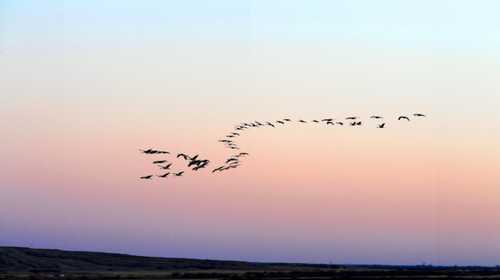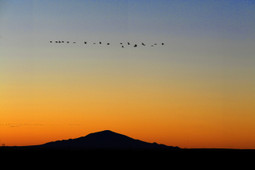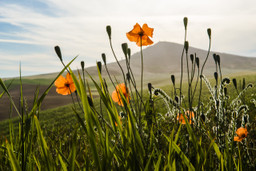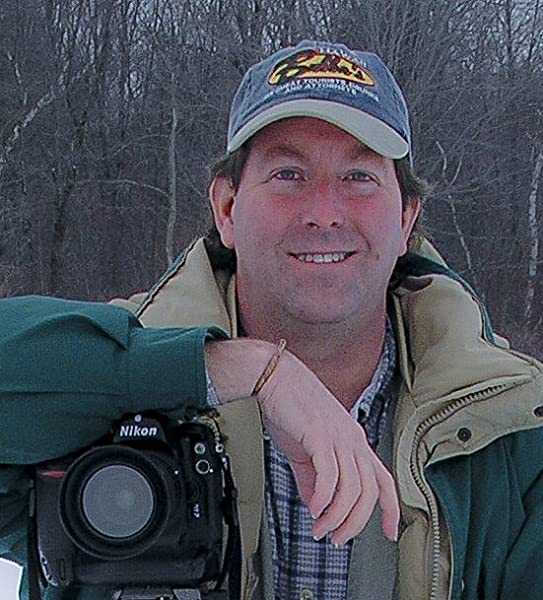
A few days ago, I was approached by a hiker and his granddaughter while recording a binaural soundscape at a local wildlife refuge. Concerned about interrupting whatever I was doing, they tentatively came over to ask about the big, bulky microphone on the tripod in front of me. Smiling, I removed my headphones and carefully placed them on the little girl’s head.
The water in front of me was paved to the horizon with snow geese that had settled down to feed during their fall migration, and as you can imagine, the cacophony was epic. The smile that lit up the little girl’s face, along with her widening eyes, and her failure to come up with words that would adequately express what she was hearing and feeling, said it all.

After he had taken the headphones from his granddaughter and placed them on his own head, the man asked me the question: Why do you do this?
This is a question that I and most other people who devote time to recording the music of the natural world are asked frequently. And, I have an answer, but it goes beyond just the sounds of nature. It also applies to conversations, and it’s a critical element of effective storytelling.
I want people to appreciate the medium of sound because it forces us to slow down and listen—to not just hear, but to truly listen, to absorb what’s being shared. I want people to heed the quote, “I like radio better than television because the pictures are better.” I want people to decelerate to the linear pace of an ambient soundscape, or interactive human conversation, not the staccato drumbeat of television and video where jump cuts happen every couple of seconds, giving us precious time to absorb what just crossed our visual field.
I want listeners to be more contemplative, more introspective. I want them to be more deliberate in their listening, committed to the idea that what this person or creature has to say may be important, regardless of whether I agree with them, regardless of whether I understand. Either way, it’s a message worth listening to.
A few weeks ago, I interviewed Hank Lentfer, an Alaska-based wildlife sound recordist whose work is awe-inspiring. Somehow, we got onto the subject of curiosity (a topic of intense interest for me), and he said something that was so insightful that I’ve thought about it ever since. “Imagine a circle that surrounds everything we know. Inside the circle is our accumulated knowledge; outside the circle is the unknown. As we learn more, the circle gets bigger. But consider this: As the circle expands, it creates more surface area to touch what we don’t know.” Interesting analogy, isn’t it? The more we know, the more access we have to what we don’t know. That’s a gift.
I want listeners to understand that as audio producers, we engage in these Quixotic quests because the stories we tell might make someone think, or be inspired, or get angry, or smile, or be more curious, or want to know more. We interview the people we do because we believe that they have an important story to tell, and we want to give them a voice and a platform. Sound is the first of our senses to awaken in the womb, and as one of my favorite field recordists likes to say, “Don’t you find it interesting that we have eyelids, but we don’t have ear lids? Why do you suppose that is?”

So, yes, vision and touch and smell all matter, but it is sound—our sense of hearing—that binds us together, because it is through sound that we create stories. And stories? They begin with our parents and grandparents reading to us at bedtime, their voices painting pictures with words. To this day I can quote verbatim from Kipling’s “The Elephant’s Child,” and I can see what he wrote with great clarity: “There on the banks of the great, grey, green, greasy Limpopo River, all set about with fever trees, sits the Kola-Kola bird, in the wait-a-bit thorn bush.”
That story, that fable, that place, painted over and over again throughout my own childhood and that of my children as my wife and I read it to them, is what inspired me to spend much of my career in Africa and to make multiple pilgrimages to Limpopo Province. Many are the cultures in this world that do not include a written language, yet their stories, their personal narratives, the tales that define them, are no less rich or contextual or meaningful simply because they are strictly oral.
Stories are platforms for commonality. They are the strong base upon which we build community and society, and upon which we establish norms and values through which we live our lives as individuals and as communities, and through which we forge a pax cum natura.
I have an image in my head that I never actually experienced (I probably saw it in a magazine, or perhaps it’s a Norman Rockwell moment) of a family sitting around a big radio, the kind that people had before television was common, when radios were big, beautiful pieces of furniture in the home. Everyone in the image leans in, absorbed, listening attentively to a radio program. The story, coming through the big paper cone of the speaker, read (I can only imagine) in the stentorian voice that was the style then, holds them, rapt, each forming a slightly different picture in their heads, because that’s the nature of the spoken word. It’s a tractor beam of sorts, a force that pulls us together, binds us as one. Yet each listener forges their own imagery, deep in the brain, individual experiences from a common trigger—sound. Video and television prescribe; audio suggests, catalyzes, triggers.
The cure for boredom is curiosity. There is no cure for curiosity.
So: what do I want from audio? It’s simple, really. This is not a paean for a better time, an earlier time, the good old days, because that’s a myth, often an insidious and dangerous one. It is, however, a request that we deliberately slow down and learn to listen. Radio programs and Podcasts and tracks of ambience, like writing, are the strongest form of virus. When we choose to listen to what others have to say, we are irretrievably altered by the experience. We are inoculated with knowledge, immersed in a broth of experience, and our immune system gets stronger. We become more intellectually resilient, more resistant to dogma, less willing to accept the siren song of the status quo, less likely to accept the idea that good enough is good enough. We become more curious, and as Eleanor Roosevelt said, “The cure for boredom is curiosity. There is no cure for curiosity.”
And that is why I sit here, quietly listening.

Dr. Steven Shepard is a Vermont-based professional author, photographer, audio producer, and educator with more than 40 years’ experience in the technology industry. He has written books and articles on a wide variety of topics – from history to wildlife sound recording – and worked in more than 100 countries. Steve is also the producer and host of the Natural Curiosity Project Podcast, and de facto representative in the US of the UK-based Wildlife Sound Recording Society.
Earth.fm is a completely free streaming service of 1000+ nature sounds from around the world, offering natural soundscapes and guided meditations for people who wish to listen to nature, relax, and become more connected. Launched in 2022, Earth.fm is a non-profit and a 1% for the Planet Environmental Partner.
Check out our recordings of nature ambience from sound recordists and artists spanning the globe, our thematic playlists of immersive soundscapes and our Wind Is the Original Radio podcast.
You can join the Earth.fm family by signing up for our newsletter of weekly inspiration for your precious ears, or become a member to enjoy the extra Earth.fm features and goodies and support us on our mission.
Subscription fees contribute to growing our library of authentic nature sounds, research into topics like noise pollution and the connection between nature and mental wellbeing, as well as funding grants that support emerging nature sound recordists from underprivileged communities.

